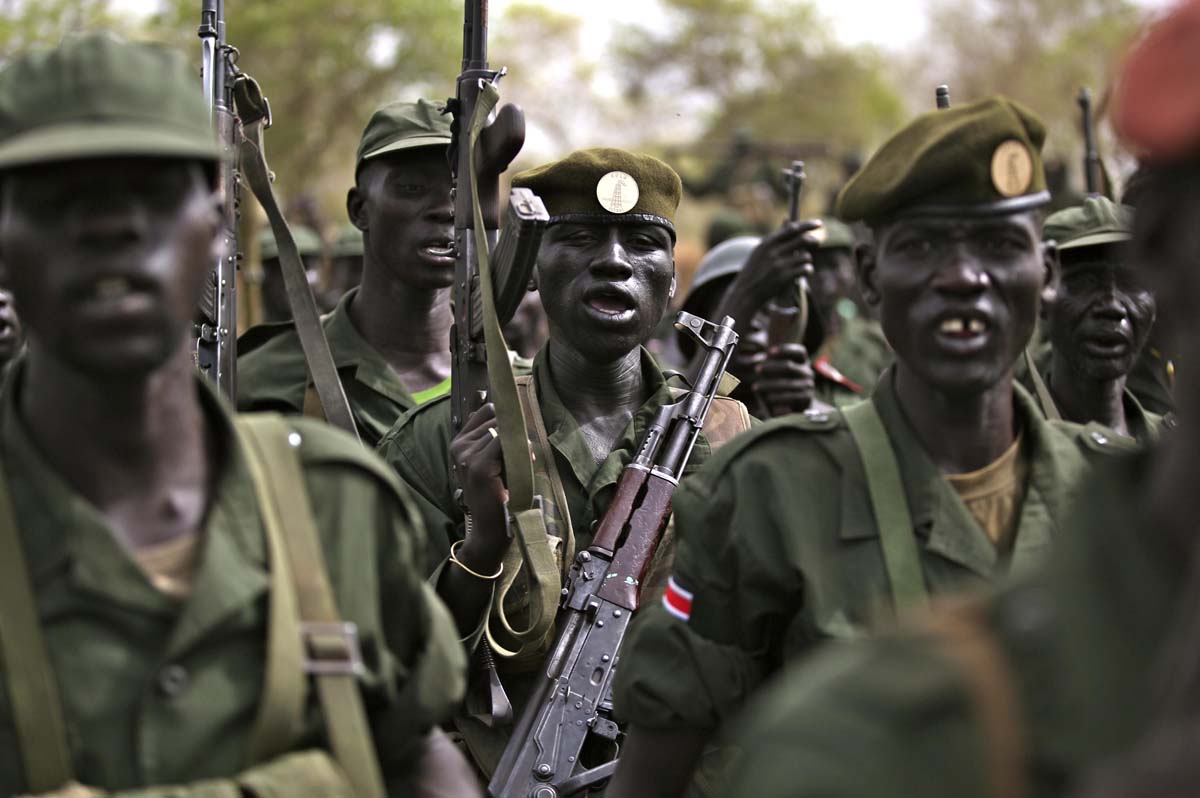South Sudan Army Raped And Burnt Girls Alive: UN
South Sudanese soldiers

NEW DELHI: The UN mission in South Sudan (UNMISS) warns of "widespread human rights abuses" including gang-rape and torture in a report that is based on 115 victims and eyewitnesses from the northern state of Unity -- the scene of some of the heaviest fighting in the country’s 18 month long civil war.
The report notes the role of the military, the Sudan People's Liberation Army (SPLA) in torturing, raping and killing civilians whilst battling rebel forces. Survivors of these attacks reported that SPLA and allied militias from Mayom county carried out a campaign against the local population that killed civilians, looted and destroyed villages and displaced over 100,000 people," the UN said. "Some of the most disturbing allegations compiled by UNMISS human rights officers focused on the abduction and sexual abuse of women and girls, some of whom were reportedly burnt alive in their dwellings."
The report notes at least nine separate incidents where "women and girls were burnt in tukuls (huts) after being gang-raped,” in addition to dozens of cases of sexual violence, including reports of mothers being raped in front of their children. One eyewitness detailed seeing "government forces gang-raping a lactating mother after tossing her baby aside," whilst another described how troops made a women squeeze "burning-red coals" in her hands to reveal the locations of rebels. Others, the report added, were simply “shot and killed.”
The conflict in South Sudan, which won independence from Sudan in 2011, has left thousands dead and over a million displaced since December. The conflict began with a skirmish in the capital city of Juba between forces loyal to the President, Salva Kiir, and those loyal to the former Vice President, Riek Machar, spread from a city-wide to national conflict.
The context of tribalism and frustration with government corruption fuelled the conflict, particularly in areas where the majority Dinka tribe was living alongside other tribes. The pro government and rebel forces are organised according to these ethnic dimensions, with President Salva Kiir’s Dinka tribe pitted against militia forces loyal to Machar’s Nuer people.
Kiir still maintains control of the capital and large swathes of the army, and is backed by troops from Uganda. Rebels say Kiir is a dictator, whilst pro-government factions have accused Machar of inciting a coup that led to the violence. As the two sides gain and lose territory sporadically, rights violations and civilian abuses continue despite a ceasefire signed earlier this year.
The UN has previously referred to the conflict in Sudan as a “massacre,” when in April rebel troops overran Bentiu, the capital of the oil producing Unity state. More than 200 muslims seeking shelter inside a mosque were killed after rebel forces seized the town, prompting the United Nations Mission in South Sudan (UNMISS) to condemn the “targeted killings of civilians based on their ethnic origins and nationality.”
Pointing to the sectarian nature of the conflict in South Sudan, the UN said those “associated with the opposition” had used radio services to broadcast hate speeches, urging "men from one community to commit vengeful sexual violence against women from another community.”
“They [rebel forces] searched a number of places where hundreds of South Sudanese and foreign civilians had taken refuge and killed hundreds of the civilians after determining their ethnicity or nationality," the report stated, adding that those killed included members of the Nuer ethnic group who did not join other Nuers in cheering for the rebels.
At the Kali-Ballee mosque, where many had taken shelter, the rebels “separated individuals of certain nationalities and ethnic groups and escorted them to safety, while the others were killed.”
South Sudan rebels have denied the UN’s claims, saying that others, including government forces, were behind the killings.
The capture of Bentiu, was followed by the storming of a UN base in South Sudan in the war ravaged government controlled town of Bor, where at least 58 people were killed, most belonging to the Nuer tribe. The attack led the South Sudan government to pin responsibility on the UN. “The UNMISS force shot bullets on air. Their shooting of bullets on air provoked the situation," Information Minister Michael Makuei Lueth told reporters, in a statement reflective of the deteriorating security situation in South Sudan. A spokesman for UN chief Ban Ki-moon said the attack on the UN base was a "serious escalation" in the crisis and that "any attack on United Nations Peacekeepers is unacceptable and constitutes a war crime."



